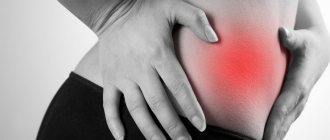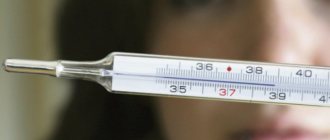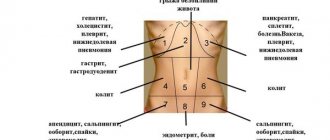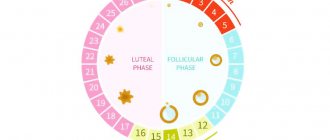Representatives of the fair half of humanity, with the appearance of a feeling of discomfort during the menstrual cycle, namely with painful sensations in the mammary glands, often wonder why their breasts hurt during menstruation.
Chest pain has various causes, ranging from a banal hormonal “surge” in the female body to diseases of the female genital area that require special attention. In this article we will try to find out the causes of chest pain and highlight the main methods of preventing and combating it.
What happens to the breasts before menstruation: the hormonal mechanism for the development of pain
Let's take a closer look at the ovulation process. Until its onset, one egg is inside the follicle, but in the middle of the menstrual cycle it is released from the follicle cavity and begins its movement into the uterine cavity, moving through the fallopian tubes. The duration of ovulation is from 4 to 6 days; this period of the cycle is the most favorable for pregnancy. During ovulation, the following hormones are released in a woman’s body:
- Progesterone and estrogen - they contribute to the thickening of the endometrium, preparing it to receive a fertilized egg;
- Oxytocin and prolactin - thanks to the coordinated activity of these two hormones, the female body prepares for breastfeeding; It is these hormones that influence the occurrence of pain in the chest.
Typically, chest pain begins to bother a woman in the middle of the menstrual cycle: by this time, discomfort increases and it is simply impossible to touch the mammary glands due to intense pain. This state of a woman, from the point of view of the physiological characteristics of the female body, is normal, because on the 14-15th day of the cycle ovulation occurs, which is accompanied by hormonal changes in the female body.
What pathological causes could there be?
Swelling of the abdominal walls should not cause significant discomfort. If a woman, in addition to bloating in the lower abdomen, experiences cutting pain, loud gurgling in the intestines and other negative symptoms, then this may indicate the progression of the pathological process.
The most common pathological causes include:
- Diseases of the genitourinary function. If during menstrual bleeding, in addition to bloating, pain, weakness, swelling are noted, and bags form under the eyes, this probably indicates the presence of nephritis.
- Disturbances in the functioning of the gastrointestinal tract. With a changing hormonal background, an exacerbation of diseases of the internal organs of the abdominal cavity begins. Due to the large influx of blood and the enlargement of the uterine cavity, gas formation is formed, which distends the abdominal cavity. Abnormal bowel movements, spasms, nausea may also occur, and the most distinctive feature is cutting pain in the navel area and slightly above.
The stomach often becomes bloated due to problems in the gastrointestinal tract.
- Pathological changes in gynecological organs. There are cramping pains that radiate to the lumbar area or the anus, and discharge may also change. Sometimes, in rare cases, it is accompanied by stool disturbances.
- One of the causes of bloating in the lower abdomen during PMS in women may be neoplasms that put pressure on the intestines and disrupt its function.
In addition to the above reasons, bloating can be observed after follicular puncture, which in rare cases is accompanied by bleeding.
1
Description and symptoms
Bloating before menstruation is a condition of the intestine in which a large amount of gases grows and accumulates in its cavity, unable to leave the body on its own. Due to the increase in intestinal volume, the abdominal cavity increases, which visually makes the stomach larger in volume (by about 3-4 cm).
Against the background of hormonal changes, the appearance of bloating gives an additional reason for nervousness, especially if the period of PMS occurs during an important event in life. An increase in progesterone levels provokes increased appetite and fluid retention, so a woman’s weight may change by several kilograms before and after menstruation.
It is not difficult to determine the presence of bloating. This condition is manifested by the following symptoms:
- 1. A feeling of fullness from the inside, which is accompanied by flatulence.
- 2. The appearance of spasms and nagging, aching pain in the lower segment of the abdomen.
- 3. An increase in the volume of the abdomen, which manifests itself in the inability to wear tight clothes.
- 4. The appearance of swelling of the limbs.
- 5. Rumbling in the stomach, independent of food intake.
The situation is aggravated by stool disorder, which practically does not depend on the food consumed. Prolonged constipation or diarrhea provokes additional pain, so the problem should be dealt with at the initial stages, preventing its progression.
Clinical manifestations directly depend on what exactly provoked their appearance. A hard belly that hurts, swells, enlarges and inflates before your eyes is a signal of the development of a serious disease. In order to independently recognize the presence of danger, differentiating hormonal changes from other pathologies, you should pay attention to such alarming symptoms as:
- 1. Increased body temperature, chills, fever - may indicate the presence of an inflammatory process in the intestines or appendicitis.
- 2. Severe, sharp, spasmodic and cramping pain in the lower abdomen.
- 3. The appearance of vomiting and profuse diarrhea.
- 4. Semi-fainting, increased heart rate and breathing.
- 5. The appearance of swelling (and not only one part of the body swells, but also the face, stomach, buttocks).
The above symptoms can appear not only during menstruation, but also during the development of a dangerous disease that requires immediate hospitalization and medical supervision.
A woman's lower abdomen hurts, as before menstruation: causes and treatment
Possible causes of chest pain in women
Let's take a closer look at the main causes of chest pain during menstrual periods.
- Ectopic pregnancy;
- Changes in hormonal levels;
- Gynecological diseases (fibrocystic mastopathy, mastitis, polycystic ovary syndrome, uterine fibroids, tumor formations);
- Long-term use of combined oral contraceptives and other hormonal drugs;
- Nervous shock and frequent overwork;
- Lack of vitamins and microelements in the female body that affect the coordinated functioning of the organs of the female reproductive system.
Results
The most common cause of bloating before your period is a problem with your intestines.
Intestinal diseases can cause gas formation, flatulence, rumbling, stool disturbances and other unpleasant symptoms. Proper nutrition, keeping the body hydrated, moderate exercise and massage can cope with this problem. However, if acute cutting pain occurs, you should immediately seek medical help.
Bloating during periods is a common problem that affects millions of women. You can get rid of it using home methods, but first you need to identify the cause of the disorder, otherwise any therapy will be useless, and unpleasant symptoms will return with each cycle.
A few words about the high sensitivity of female breasts during menstruation
In the second half of the menstrual cycle, on the eve of ovulation, the sensitivity of the breasts and especially the nipples increases several times. This is achieved through the process of proliferation: epithelial growth is observed in the lobules and ducts of the mammary gland. The blood supply to the mammary glands increases, swelling increases, as a result of which the breasts swell and increase in volume. When menstruation ends, the sensitivity of the nipples returns to normal and the feeling of discomfort gradually ceases to bother the woman.
Important! If, after the end of your period, high sensitivity of the mammary glands continues and the pain does not stop, you should consult a doctor.
When to see a doctor
There is no need to ignore these symptoms and engage in self-diagnosis, because ordinary flatulence can be a harbinger of dangerous diseases that require treatment for bloating and abdominal pain during menstruation as soon as possible.
Why does my stomach swell before my period? If you want to find out, watch this video:
In some situations, medical assistance may be needed:
- during menstruation, the release of large blood clots;
- bleeding;
- severe pain when lying on your stomach;
- hard belly and increased flatulence;
- with any movement, a stiff, spastic pain appears;
- if the stomach is bloated and there have been no periods for more than a month;
- frequent nausea and even vomiting are observed;
- lack of appetite, lethargy and fatigue;
- high body temperature, chills;
- a bloated abdomen after the end of menstruation may indicate gastrointestinal disorders or the presence of tumors in the reproductive organs, such as fibroids.
Diagnostic tests are prescribed by a specialist to establish a diagnosis. The following laboratory tests and instrumental examinations are carried out:
- general blood analysis;
- general urine analysis;
- scatological research;
- endoscopy;
- ultrasound of female organs;
- abdominal ultrasound;
- laparoscopy and MRI (if indicated).
Endoscopy will help find the cause of bloating.
Bloating syndrome during menstruation and PMS is a very common phenomenon, which is caused by hormonal changes. But you need to listen to how you feel, since ordinary bloating can be a harbinger of a serious illness. You must follow all instructions and recommendations of a specialist.
The table shows remedies and products that reduce bloating during menstrual flow.
| Symptoms | Analgesic medications | Medicines for gas formation | ethnoscience | Products that reduce gas formation |
| Bloating and gas during menstruation | No-shpa, Drotaverine, Spazmalgon, Spazgan, Baralgetas, Papaverine, Halidor, Buscopan | Espumisan, Motilium, Antareit, Bifiform, Linex, Polysorb, Hilak-forte, Pancreatin, Smecta | Mint, fennel, dill, cranberry, chamomile, cumin, sage, juniper, wormwood, lingonberry, lemon balm, | Pineapple, garlic, sweet potato, cucumbers, tomatoes, ginger, peaches, berries, bran, mushrooms, nuts, dried fruits, bananas |
What changes in the mammary glands accompany pain during menstruation?
Let us highlight the main changes that occur in the mammary glands at the time when a woman begins her period:
- When the mammary gland swells, it compresses the surrounding fascia, contributing to the appearance of pain.
- The glandular tissue of the mammary glands increases in volume and its density increases.
- The lumen of the mammary gland ducts expands.
- The nipples swell and become rough, becoming more sensitive.
Prevention of an unpleasant condition
If your stomach becomes larger during menstruation, flatulence and other unpleasant sensations appear, it is important to pay attention to the food that is regularly present in the diet. To prevent bloating you need to:
- Avoid excess salt. Minimize salting of dishes, exclude canned food, homemade preparations, salted fish, nuts and other snacks. Salt retains water and causes severe bloating.
- Reduce your consumption of sweets. Sugar, like salt, can cause bloating and provoke sodium deposition.
- Increase your water consumption. It is necessary to drink herbal teas and non-carbonated liquids. It removes harmful substances and improves metabolism. You can increase your fluid intake by increasing the amount of fruits and vegetables in your diet.
- Avoid caffeine. This substance provokes bloating and flatulence, so green tea and coffee should be consumed in limited quantities.
- Increase the amount of foods with vitamins A, E, B. Red berries, mint tea, fermented milk products, unrefined olive oil.
Why do breasts become enlarged and painful during menstruation?
About a week before the start of the critical days, some girls notice a slight increase in breast volume, swelling, increased sensitivity, and the color and shape of the nipple changes somewhat. This picture is not outside the norm. However, at the end of menstruation, the symptoms listed above should disappear without a trace.
What is the reason for breast enlargement before and during menstruation? The thing is that after ovulation, a woman’s hormonal balance changes. The follicle bursts, and in its place the corpus luteum begins to form, which synthesizes the hormone progesterone. It is responsible for pregnancy and prepares the woman’s body for lactation. If pregnancy does not occur, the concentration of progesterone gradually decreases, and at the same time, all symptoms associated with swelling and pain in the breast soon disappear.
What happens in the female body if menstruation still does not begin? In this case, when the breasts have become enlarged, swollen, more and more full, the stomach begins to hurt, and the woman may wonder about a possible pregnancy.
In both cases, it is necessary to consult a gynecologist to verify that pregnancy has occurred or to refute it!
Gurgling in the stomach before menstruation
> Medicine
Almost every person's stomach rumbles This is mainly due to hunger. The body thus gives us a sign that it is time to eat. Girls on half-starvation diets suffer from rumbling in the intestines. But sometimes rumbling in the stomach is caused by serious pathologies that require prompt diagnosis and treatment.
Why does my stomach growl?
This symptom appears at any time of the day and in people of any age, including children and adolescents. If you don’t have the habit of eating in the morning, you are guaranteed to have a rumbling stomach in the coming hours while your body is hungry. Moreover, even if you drink coffee with 1-2 tsp. Sahara.
In such cases, the rumbling comes not so much from the intestines as from the stomach. Even if you're full, you're still likely to rumble when you see or smell delicious food. The gastrointestinal tract begins to intensively produce acid designed to digest foods, because it believes that you are about to eat.
This causes strange sounds in the intestines. The second reason for this symptom is eating too much food, especially after 4 or more hours of fasting. When you eat “heavy” and fatty foods, the risk of stomach rumbling increases. When you overeat, a food bolus forms in the abdominal cavity.
Its movement is accompanied by increased peristalsis, which is necessary for grinding food. Hence the rumbling.
The cause of a rumbling stomach can be severe anxiety. After calming the nervous system, the symptom disappears. Rumbling in the stomach sometimes after eating certain foods and drinks.
The greatest risk of occurrence of the symptom in question is when drinking alcoholic beverages and/or carbonated drinks (both sweet and regular mineral waters).
Body position directly affects the process in the intestines. Standing or sitting, you are unlikely to worry about sounds in your stomach. But lying down poses contribute to the appearance of rumbling.
Stomach growls before period
Before the start of this period, physiological changes occur in the body of a woman/girl. Hormonal levels change, which delays metabolic processes in the body. Therefore, blood flow pressure may increase in the pelvic organs. It's not dangerous at all.
Often, in the first days of menstruation, unpleasant symptoms disappear on their own and do not appear again. In some women, bloating and pain in the intestines persist throughout the critical days. The reason is that uterine spasms also affect intestinal activity, which can cause rumbling in the stomach.
Other physiological ailments can also cause stomach rumbling. This occurs against the background of disturbances in the vitamin and mineral balance. After a few days everything goes away without special treatment. There is no need to worry about your stomach growling; this is a normal process.
What diseases cause Rumbling in the stomach:
This symptom can be provoked by a disease such as dysbiosis. Along with rumbling, there is also discomfort in the abdomen, bloating, pain, and possible bowel problems (constipation or diarrhea). Dysbiosis is caused by bacteria that “live” in the intestines.
A common cause of pathology is the use of antibiotics. As a result, beneficial bacteria in the body die, normal microflora is disrupted, which implies the diagnosis of “dysbacteriosis.” A large amount of intestinal gas is formed in the gastrointestinal tract due to the fact that some substances are not digested normally.
This explains the rumbling in the stomach, and can lead to more serious problems and complications. Flatulence occurs - another symptom of dysbiosis. After the next rumbling, gases often pass.
This symptom can indicate not only a violation of the intestinal flora, but also dyspepsia, intestinal hypermotility and even tumors.
Rumbling in the stomach after eating (systematic or too loud) indicates that the stomach and/or intestines are not working quite normally. If bloating appears after eating, you urgently need to go to the doctor, this may be a sign of a number of diseases, including developing gastritis. Gastritis threatens to develop an ulcer in the future if left untreated.
A rumbling stomach may be a symptom of irritable bowel syndrome. This pathology (which exists in all countries of the world, among people of all races and ages) is characterized by unpleasant sensations in the intestines (including pain) and defecation disorders (constipation, diarrhea, frequent urge, heavy passage of feces, etc.). ).
The manifestations of irritable bowel syndrome, in addition to rumbling in the intestines, may vary.
Rumbling in the stomach and diarrhea: pathologies
If you have a rumbling stomach and diarrhea, it is most likely dysbacteriosis. It is recorded mainly in persons with impaired diet. There is an increased risk for those who eat fast foods and processed foods, and also eat on the go. Not only the stomach suffers, but also other digestive organs.
Diarrhea and rumbling in the stomach may indicate an intestinal infection. Expired, improperly stored or insufficiently processed products can provoke such a reaction. Treatment is carried out with absorbents that remove excess from the body. If rumbling and diarrhea persist for several days and medications do not help, it is best to immediately see a gastroenterologist.
Rumbling in the abdomen and frequent bowel movements may indicate osmotic and secretory diarrhea. The first type occurs when consuming substances that are not absorbed normally by the intestines. This can happen with individual lactose intolerance.
This also happens with food allergies. Secretory diarrhea is caused by water that accumulates in the intestinal lumen with bacterial toxins. The presence of large amounts of fluid leads to the appearance of watery, loose stools.
In this case, such an unpleasant and undisguised symptom as gurgling occurs.
Rumbling in the stomach and the appearance of gas
The combination of these two symptoms indicates flatulence. Today this is a common problem among people who do not care about their own nutrition.
By consuming a lot of sour, fatty foods with chemical additives, you increase the risk of intestinal disorders and a rumbling stomach.
Flatulence means that gases accumulate in your intestines, rushing out, but not always coming out. Indigestible carbohydrates cause gas formation.
Gas and stomach rumbling can be caused by quickly swallowing food and eating too large pieces (when a person does not chew food well). This problem also occurs when a person talks while eating.
Lactose, which is found in dairy products, can trigger these symptoms.
The reason may also be constipation, which prevents food from moving through the intestines at a normal speed, thereby increasing the likelihood of fermentation.
Stomach growls at night
The reasons in such cases may be different. Sometimes a person eats long before bed. If you have this situation, half an hour before bedtime you can drink kefir, eat 30 grams of dried fruits, 1 fruit, 1 vegetable or a small portion of vegetable salad.
But the reason may also be illness. If you lie on your left side and hear unpleasant sounds, it is most likely gastritis. But you cannot make this diagnosis yourself; you need to make an appointment with a qualified specialist.
Rumbling at night can indicate diseases such as pancreatitis, colitis, dysbiosis, etc. It is difficult for the stomach to cope with food that was eaten shortly before going to bed. If rumbling in the evening and at night is combined with pain, nausea or vomiting, you need to urgently visit a therapist or gastroenterologist.
Stomach growls on the right
Sometimes the rumbling is localized in the right side. If the symptom is combined with sour belching, this speaks in favor of cholecystitis or pancreatitis.
The reason may also be the consumption of low-quality products that are contaminated or are not digested normally. If, in addition to rumbling on the right, there is stool disorder and pain in the abdomen on the right, poisoning should be suspected. Treatment often begins with gastric lavage.
Rumbling in left stomach
If rumbling is heard from the left side, this means that the peristalsis of the stomach or large intestine is significantly increased. Food moves at a rapid pace, faster than necessary. In this case, the processes of chemical processing of food by digestive enzymes are disrupted. Food is less digestible. In such cases, diarrhea may occur. The process may indicate infectious gastroenteritis.
Another likely cause is chemical irritation, which occurs when toxins enter the body, drink alcohol, or eat food poisoning. Food allergies may be another reason why your left stomach is rumbling.
Rumbling in the stomach during pregnancy
Many pregnant women wonder whether rumbling in the stomach is a sign of a serious pathology? At any stage, rumbling may periodically appear, even if the expectant mother does not have any problems with the gastrointestinal tract.
The cause of bowel sounds is a change in the balance of hormones as the fetus develops in the mother's belly.
Progesterone levels rise, causing smooth muscles in the body, including the intestines, to relax.
From the 4th month of pregnancy, there may be disturbances in the physiological location of the intestines due to fetal growth. The organ is compressed and displaced by the uterus to a certain extent, because the growth of the fetus is purely individual. These factors affect the formation of gases, the process of emptying is disrupted, and peristalsis is reduced to a certain extent.
To make symptoms less bothersome to a pregnant woman, irritating foods need to be excluded from the diet. You can track them yourself by making notes after eating and recording the reaction of the gastrointestinal tract to what you eat. Before changing your diet, you should talk to the therapist who is monitoring the pregnant woman.
After all, the reason for a rumbling stomach in a pregnant woman may also lie in serious pathologies.
Source: https://nekurim.info/info/pered-mesjachnymi-bulkaet-v-zhivote/
Physiological discharge from the breast before menstruation
Soreness in the chest before the onset of menstruation may be accompanied by discharge from the nipples: women complain that on the eve of menstruation, and sometimes on the first day of menstruation, when the discharge is smeared, fluid is released from the nipples.
How much should it normally be released? In some healthy women, episodic discharge from the nipples occurs 2-3 days before the onset of menstruation. On the eve of menstruation, when pressing on the nipple, literally 1-2 drops of light liquid may come out of the breast.
Such scanty white discharge is also a variant of the norm. On the 4th day after menstruation begins, when spotting appears, the pain usually subsides, and the woman’s general condition improves.
Prevention Tips
There are rules that can be followed to reduce the intensity of bloating before the onset of menstruation.
We are talking about a problem caused by physiological processes, not pathology. Doctors advise considering the following:
- Magnesium, potassium and vitamin B will reduce irritable bowel syndrome and normalize stool. Useful elements are taken both individually and as part of vitamin complexes.
- Salty, spicy and smoked foods retain fluid in the body. This aggravates the existing situation. Therefore, before your period, it is advisable to give up unhealthy foods .
- Soda, alcoholic drinks and coffee negatively affect the functioning of the gastrointestinal tract. Their use must be stopped.
- Wearing loose clothing during the premenstrual period will reduce the occurrence of flatulence.
- Reducing food portions will help avoid feelings of heaviness and fullness in the stomach. It is better to eat little by little, but at least 5 times a day.
- A sedentary lifestyle negatively affects intestinal motility. It is recommended to practice daily walks . Moderate mobility helps remove gases from the stomach. It is not advisable to overuse physical activity.
- If you exclude gas-forming foods from your diet , abdominal discomfort will significantly decrease. It is not recommended to eat cabbage, legumes, bananas, flour products, milk and sweet desserts. It is advisable to eat more protein foods and drink a lot of clean water.
- Taking a bath with the addition of essential oils of eucalyptus, tea tree or juniper has a positive effect on the functioning of the digestive tract. For one procedure, 3-4 drops of oil are enough. But you can’t take such baths during your period.
Causes of bloating before menstruation
To combat the unpleasant symptoms of PMS, it is necessary to accurately determine the mechanism of their occurrence. Could bloating before menstruation be associated with pathologies? Yes, and you should definitely double-check this option. But there are other factors as well.
Hormonal reasons
A large belly on the eve of menstruation is associated with an increased concentration of progesterone; it is this hormone that is responsible for preparing the genital organs for conception. After ovulation, in the so-called luteal phase, the endometrium (the lining inside the uterus) grows. It serves to nourish the embryo with all the necessary substances. The uterus swells and puts pressure on neighboring organs. When the body realizes that conception has not occurred, the endometrium exfoliates and comes out with blood during menstruation. The size of the abdomen returns to normal.
Intestinal peristalsis
The heavier uterus puts pressure on the intestines. Progesterone itself has an additional effect. It reduces the tone of the lower esophageal sphincter, gastric emptying takes longer, and food moves more slowly. Under the influence of the hormone, unpleasant intestinal symptoms before menstruation become more pronounced, pain in the abdomen, rumbling, lack of appetite, constipation or diarrhea may appear.
Pregnancy
When pregnancy cannot be ruled out and there is a delay, that is, the period has passed, but they are still missing, the first thing you should do is take a test. Two stripes appear on a special indicator after contact with urine if a specific hormone is detected - human chorionic gonadotropin (hCG).
But it is worth remembering that the result may be distorted due to pathological processes, for example, in the case of an ectopic pregnancy. To be completely sure, it is better to contact an antenatal clinic. An effective diagnostic method is pelvic ultrasound.
Pathological processes
Gynecological diseases - fibrosis, endometriosis, tumors of the uterus and ovaries - can be hidden behind a growing belly. In such cases, in addition to bloating before menstruation and swelling, the following are often present:
- failures in the regularity of the cycle;
- frequent urge to urinate;
- constant feeling of indigestion.
If your stomach is swollen and hurts, your body temperature is elevated, your bloody discharge is profuse or of an unusual color, additional symptoms appear and your health worsens, you should consult a gynecologist.
It happens that ailments similar to PMS are present, but menstruation does not begin. A check with a doctor will help rule out inflammatory processes and neoplasms in the genital organs.
Binge eating
Due to hormonal changes, many women feel hungry towards the end of their cycle. They are constantly drawn to eat, and the situation is aggravated by stress. But trying to cheer yourself up with nourishing and tasty food is not an option. As mentioned above, before menstruation and the associated flatulence, food moves through the gastrointestinal tract more slowly, for this reason, heaviness in the stomach often appears after bloating, which is very inappropriate on the eve of menstruation. It is advisable to ensure that the dishes are simple and do not burden the body.
When to worry
Diarrhea during menstruation is not always harmless. Sometimes diarrhea occurs due to serious illnesses. The following symptoms are warning signs:
- Diarrhea lasts longer than 4 days and continues after the end of menstruation.
- Diarrhea is accompanied by vomiting, nausea, dizziness, migraines, and fainting. The stomach hurts a lot both when it is touched and at rest.
- Diarrhea began a couple of days before the menstruation was due, but the menstruation itself did not arrive on time (there is a delay during which the diarrhea does not stop).
Why do these symptoms appear? The reasons for diarrhea, nausea, delays can be different - it could be the following: intestinal infections, inflammatory diseases of the female genital organs, endometriosis, etc. Delayed menstruation, nausea and diarrhea are also sometimes signs of pregnancy. In any case, if the symptoms described above appear, you must rush to the hospital, undergo the necessary tests, and find out the exact cause. If the cause is illness, then any delay is fraught with complications, so it’s better not to take risks. Take care of yourself and be healthy!
Source









